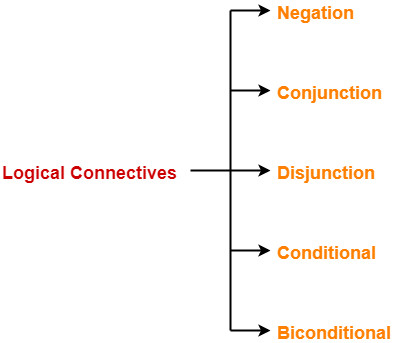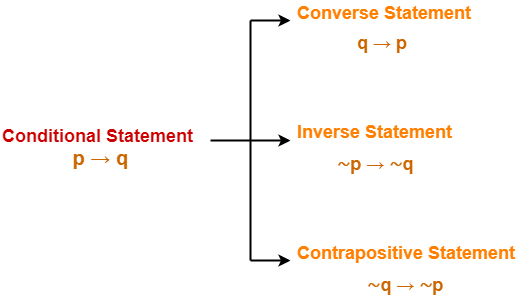Logical Connectives-
Before you go through this article, make sure that you have gone through the previous article on Logical Connectives.
We have discussed-
- Logical connectives are the operators used to combine one or more propositions.
- In propositional logic. there are 5 basic connectives-

Also Read- Propositions
In this article, we will discuss Converse, Inverse and Contrapositive of a conditional statement.
Converse, Inverse and Contrapositive-
For a conditional statement p → q,
- The converse statement is q → p
- The inverse statement ∼p → ∼q
- The contrapositive statement is ∼q → ∼p

Important Notes-
Note-01:
- For conditional statements (p → q) only, the converse, inverse and contrapositive statements can be written.
Note-02:
| Performing any two actions always result in the third one. |
For example-
- Inverse of converse is contrapositive.
- Inverse of contrapositive is converse.
- Converse of inverse is contrapositive.
- Converse of contrapositive is inverse.
- Contrapositive of inverse is converse.
- Contrapositive of converse is inverse.
Note-03:
For a conditional statement p → q,
- Its converse statement (q → p) and inverse statement (∼p → ∼q) are equivalent to each other.
- p → q and its contrapositive statement (∼q → ∼p) are equivalent to each other.
Also Read- Converting English Sentences To Propositional Logic
PRACTICE PROBLEMS BASED ON CONVERSE, INVERSE AND CONTRAPOSITIVE-
Problem-01:
Write the converse, inverse and contrapositive of the following statements-
- If today is Sunday, then it is a holiday.
- If 5x – 1 = 9, then x = 2.
- If it rains, then I will stay at home.
- I will dance only if you sing.
- I will go if he stays.
- We leave whenever he comes.
- You will qualify GATE only if you work hard.
- If you are intelligent, then you will pass the exam.
Solution-
Part-01:
We have-
- The given sentence is- “If today is Sunday, then it is a holiday.”
- This sentence is of the form- “If p then q”.
So, the symbolic form is p → q where-
p : Today is Sunday
q : It is a holiday
Converse Statement- If it is a holiday, then today is Sunday.
Inverse Statement- If today is not Sunday, then it is not a holiday.
Contrapositive Statement- If it is not a holiday, then today is not Sunday.
Part-02:
We have-
- The given sentence is- “If 5x – 1 = 9, then x = 2.”
- This sentence is of the form- “If p then q”.
So, the symbolic form is p → q where-
p : 5x – 1 = 9
q : x = 2
Converse Statement- If x = 2, then 5x – 1 = 9.
Inverse Statement- If 5x – 1 ≠ 9, then x ≠ 2.
Contrapositive Statement- If x ≠ 2, then 5x – 1 ≠ 9.
Part-03:
We have-
- The given sentence is- “If it rains, then I will stay at home.”
- This sentence is of the form- “If p then q”.
So, the symbolic form is p → q where-
p : It rains
q : I will stay at home
Converse Statement- If I will stay at home, then it rains.
Inverse Statement- If it does not rain, then I will not stay at home.
Contrapositive Statement- If I will not stay at home, then it does not rain.
Part-04:
We have-
- The given sentence is- “I will dance only if you sing.”
- This sentence is of the form- “p only if q”.
So, the symbolic form is p → q where-
p : I will dance
q : You sing
Converse Statement- If you sing, then I will dance.
Inverse Statement- If I will not dance, then you do not sing.
Contrapositive Statement- If you do not sing, then I will not dance.
Part-05:
We have-
- The given sentence is- “I will go if he stays.”
- This sentence is of the form- “q if p”.
So, the symbolic form is p → q where-
p : He stays
q : I will go
Converse Statement- If I will go, then he stays.
Inverse Statement- If he does not stay, then I will not go.
Contrapositive Statement- If I will not go, then he does not stay.
Part-06:
We have-
- The given sentence is- “We leave whenever he comes.”
- We can replace “whenever” with “if”.
- Then, the sentence is- “We leave if he comes.”
- This sentence is of the form- “q if p”.
So, the symbolic form is p → q where-
p : He comes
q : We leave
Converse Statement- If we leave, then he comes.
Inverse Statement- If he does not come, then we do not leave.
Contrapositive Statement- If we do not leave, then he does not come.
Part-07:
We have-
- The given sentence is- “You will qualify GATE only if you work hard.”
- This sentence is of the form- “p only if q”.
So, the symbolic form is p → q where-
p : You will qualify GATE
q : You work hard
Converse Statement- If you work hard, then you will qualify GATE.
Inverse Statement- If you will not qualify GATE, then you do not work hard.
Contrapositive Statement- If you do not work hard, then you will not qualify GATE.
Part-08:
We have-
- The given sentence is- “If you are intelligent, then you will pass the exam.”
- This sentence is of the form- “If p then q”.
So, the symbolic form is p → q where-
p : You are intelligent
q : You will pass the exam
Converse Statement- If you will pass the exam, then you are intelligent.
Inverse Statement- If you are not intelligent, then you will not pass the exam.
Contrapositive Statement- If you will not pass the exam, then you are not intelligent.
Problem-02:
What is the converse of the statement- “I stay only if you go”?
- I stay if you go.
- If I stay, then you go.
- If you do not go, then I do not stay.
- If I do not stay, then you go.
Solution-
- Try solving this problem yourself.
- Solution is in the linked video lecture.
- Option (A) is correct.
To gain better understanding about converting Converse, Inverse and Contrapositive,
Next Article- Tautology, Contradiction and Contingency
Get more notes and other study material of Propositional Logic.